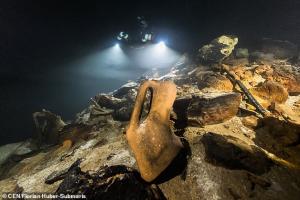 Over the years, we have posted about the “world’s oldest beer” and the “world’s oldest champagne” found in shipwrecks dating from the 1700s. Recently, divers have located roughly 200 ancient Roman amphorae, believed to originally have stored wine, in an underwater cave off the coast of Majorca.
Over the years, we have posted about the “world’s oldest beer” and the “world’s oldest champagne” found in shipwrecks dating from the 1700s. Recently, divers have located roughly 200 ancient Roman amphorae, believed to originally have stored wine, in an underwater cave off the coast of Majorca.
The ceramic containers were found in the Fuente de Ses Aiguades cave, which lies in the Bay of Alcudia on the northeastern coast of Majorca, in the Spanish Balearic Islands. Unlike the ancient beer and champagne bottles whose contents were still more or less intact, the amphorae are no longer sealed so whatever they contained, whether wine or oil, has long washed away.
How did the amphorae end up in the cave? Experts believe that they may have been left as some form of ritual offering.
The Fuente de Ses Aiguades cave was first discovered in 1998, but had not been fully explored. Recently experts returned to the cave and located the 200 amphorae, project leader Manel Fumás told Central European News.
The cave — which is around 591 feet (180 metres) long and full of stalactites and many air chambers — is accessed by a narrow vertical shaft, once reached using a pulley system.
‘The mystery lies in why there are so many amphorae. It is not normal. One could fall, when the pulley broke, but not 200,’ Mr Fumás said.
The team believes that the ceramic jugs were left in the cave by sailors for some religious purpose.

If a stack of 18th century wine bottles and barrels were found in a cave in Cornwall (UK) , say, everyone would cry ‘smugglers.’ When the equivalent from 2 thousand years ago is found this becomes ‘religious / ritual purposes.’
Was the world so different then? The cave was obviously dry then ( lower sea and water tables perhaps,) or there wouldn’t have been any ‘tites and mites’.
Sailors nicking the cargo? It has been known. In medieval times sailors would drill holes in the wine casks -tuns- suck out the wine and fill the hole with clay. Even the great Nelson was said to have had the rum he was preserved in after Trafalgar sucked out this way. A foolish rumour no doubt.
Maybe the Roman/Greek/ sailors were just doing as sailors always have. Lightening the ship, perhaps.
Seeing how the bulk of the jars were broken in the pile? I dont think they were put there to be stored. So the presumption of being an offering for an appeasement seems reasonable. The part where some of the jugs remained intact says water may have been present. As if it was dry, all the amphora would have been destroyed.